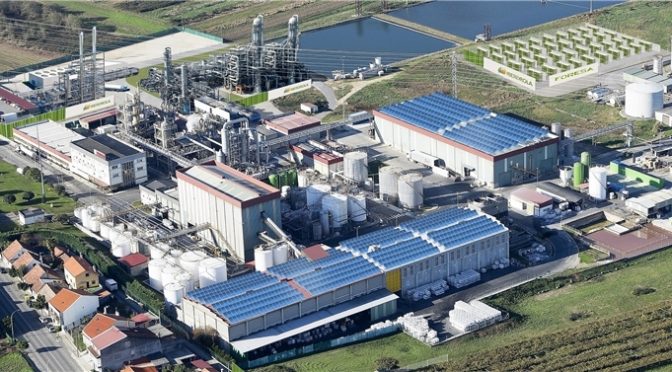- Construction of a 20 MW green hydrogen plant, expandable to 200 MW, and CO2 · capture equipment are being analysed – Green methanol would be used in Foresa’s chemical processes and surplus could be exported in the future
- The investment, which is eligible for Next Generation EU funds, would exceed 82 million euros and could reach 400 million euros in its expansion
Iberdrola and Foresa analyse the development of investments in renewable hydrogen for the industrial production of green methanol in Galicia. Both companies could tackle the construction of a 20 MW green hydrogen plant – expandable to 200 MW – obtained by electrolysis with renewable energy, as well as the installation of equipment to capture CO2 from biomass combustion plants, therefore increasing its already important carbon capture character.
The projects will be co-located at Foresa’s plants in Galicia, and the initial investment – which is eligible for Next Generation EU funds – would exceed 82 million euros; a volume that could reach 400 million if planned expansions are undertaken. In the first phase, green methanol production of 10,000 tn/year would be achieved, which could be scaled up to 100,000 tn/year, therefore preventing the emission of 470,000 tn/year of CO2.
The resulting green methanol would be used by Foresa in its chemical processes which would replace the imported methanol it currently uses for the production of wood glues and resins. In this way, the project provides essential support to the forestry value chain – which is strategic for Galicia – achieving greatly reduced emissions in key chemical products. Furthermore, the possibility of increasing production and exporting surpluses to companies that also use this raw material in their industrial processes is also envisaged.
Diversification and development of Galician industry and employment
The development of a high-tech processing plant would reduce Galician imports of methanol, replacing them with sustainable local production, boost the local chemical, mechanical, metal, electrical, forestry and auxiliary industries and create jobs.
It would also contribute to the diversification and long-term development of Galician industry. The investment initiative to decarbonise methanol and tackle its production in Spain would reinforce the region’s position as a technological benchmark in green hydrogen use and would represent an opportunity for the country, given that there is currently no domestic green methanol production and intensive demand.
The project together with Foresa is part of the 175 initiatives presented or in which Iberdrola participates in the Next Generation EU programme, which would mobilise investments of 30 billion, involve more than 350 small and medium-sized companies in Spain and generate more than 60,000 jobs per year. These projects include 53 hydrogen-related initiatives, which would trigger investments of 2.5 billion to achieve an annual production of 60,000 tonnes/year.
Green investments to promote economic recovery
Iberdrola has been leading the energy transition for two decades, acting as a key driving force to transform the industrial fabric and in the green recovery of the economy and employment. The company has thus launched a historic investment plan worth 150 billion euros over the next decade, 75 billion euros by 2025, to triple its renewable capacity and double network assets and take advantage of the opportunities offered by the energy revolution that the world’s leading economies are facing.
In Spain, investments to 2025 amount to 14.3 billion euros, mainly for the deployment of an ambitious plan for renewables and smart grids. In Spain, it is the leader in the renewable sector with an installed capacity of 16,700 MW, which will increase to 25,000 MW with its investment plan up to 2025.
Investments worth 120 billion euros over the last twenty years has made Iberdrola a leader in renewable energy with nearly 35,000 MW installed worldwide, a volume that makes its generation fleet one of the cleanest in the energy sector.
With emissions of 98 gCO2/kWh, we are already two-thirds lower than the European average, and the strategy of investing in clean energy and networks will lead Iberdrola to be a “carbon neutral” company in Europe by 2030.


